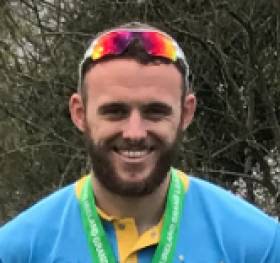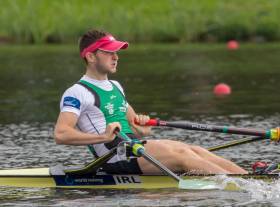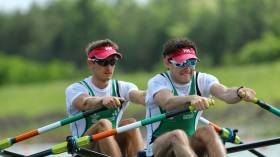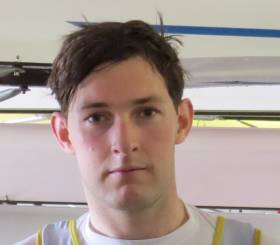Displaying items by tag: Max Murphy
Murphy Adds Gold in New Zealand
#Rowing: Max Murphy added a gold medal to the silver he had won in the men’s senior pair at the New Zealand Rowing Championships today. The UCD oarsman was part of the Waikato senior eight which were clear winners, beating a crew from their own club into second. Kevin Neville and Eamon Power of NUIG were in the Wellington crew which took bronze.
In warm and calm conditions, Paul O’Donovan and Gary O’Donovan finished fourth in the Premier double sculls, an elite event won by Chris Harris and Robbie Manson.
New Zealand Rowing Championships, Lake Karapiro, Day Four (Irish interest)
Men
Eight – Senior
Final: 1 Waikato (3 M Murphy) 5:56.41; 3 Wellington (7: K Neville; 8 E Power) 6:00.28.
Pair - Senior
Final: 2 Waikato (M Murphy, T Bedford) 6:59.41.
Sculling,
Double – Premier
Final: 4 Skibbereen (P O’Donovan, G O’Donovan) 6:38.66. Senior – B Final: 1 Wairau (2 K Neville) 6:46.04.
Single – Club
B Final: 5 Wairau (E Power) 8:11.15.
Max Murphy Takes Silver Medal at New Zealand Championships
#Rowing: Max Murphy took a silver medal at the New Zealand Rowing Championships on Lake Karapiro. The UCD man teamed up with Thomas Bedford in the Waikato crew which took second in the men’s senior pairs behind Avon Rowing Club and ahead of another Waikato crew.
New Zealand Rowing Championships, Lake Karapiro, Day Four (Irish interest)
Men
Pair - Senior - A Final: 2 Waikato (M Murphy, T Bedford) 6:59.41.
Ireland Pair in Tight Finish in New Zealand
#Rowing: Mark O’Donovan and Shane O’Driscoll were eliminated from the Premier Pair at the New Zealand Rowing Championships on Wednesday (local time). The world lightweight pairs champions knew they would have some tough races as they learnt their trade in the heavyweight ranks, and this was one. In a tight repechage, rowed into a headwind, the Skibbereen men lost out by 1.64 seconds a three-way battle for the crucial third and fourth places which guaranteed a slot in the final.
Max Murphy secured a place in the final of the men’s senior pair, as his Waikato crew finished second in a repechage, while Eamon Power won his repechage of the club single sculls to secure a place in the semi-finals.
New Zealand Rowing Championships, Lake Karapiro, Day One (Irish interest; selected results)
Men
Pair – Premier - Repechage (Top Four to Final; rest eliminated): 5 Skibbereen (S O’Driscoll, M O’Donovan) 7:11.47.
Senior - Repechage (Top Three to Final): 2 Waikato (M Murphy, T Bedford) 7:33.13.
Sculling, Single – Club – Repechage One (First Two to Semi-Final): 1 Wairau (E Power) 8:19.07.
Paul O'Donovan and Max Murphy Impress in New Zealand
#Rowing: Paul O’Donovan was the pick of the Irish internationals at the testing New Zealand Rowing Championships on Lake Karapiro on Tuesday. O’Donovan finished third in his heat of the Premier (openweight) single sculls – just .11 of a second behind the winner of the other heat, Mahe Drysdale, the Olympic champion. O'Donovan will get a second chance to make the final through the repechages.
The pair of Mark O’Donovan and Shane O’Driscoll took fourth in their heat, while a four with the three O’Donovans and O’Driscoll also conserved energy for Wednesday’s repechages. The double of Paul and Gary O’Donovan took part in a race for lanes and took fifth.
It was another good day for UCD’s Max Murphy, who is competing for Waikato. He was part of the club’s senior four which won their heat and progressed directly to the final. In the pair, Murphy placed third in a heat.
Kevin Neville of NUIG, competing for Wairau, qualified for the senior double semi-finals. Neville and Eamon Power, also of NUIG and rowing for Wairau, are set for repechages in the senior and club singles respectively.
New Zealand Rowing Championships, Lake Karapiro, Day One (Irish interest)
Men
Four – Premier (First to Final; rest to repechage)– Heat Two: 4 Skibbereen (S O’Driscoll, M O’Donovan, P O’Donovan, G O’Donovan) 7:05.67.
Senior (First to Final; rest to repechage) - Heat Two: 1 Waikato (3 M Murphy) 6:25.58.
Pair – Premier (First to Final; rest to repechage): Heat Two: Skibbereen (S O’Driscoll, M O’Donovan) 7:24.79.
Senior (First to Final; rest to repechage) – Heat Two: 3 Waikato (M Murphy, T Bedford) 7:11.58.
Sculling,
Double – Premier (All go to Final): 5 Skibbereen (P O’Donovan, G O’Donovan) 7:20.97.
Senior – (First Four to Semi-Finals: rest to Repechages) – Heat Three: 3 Wairau (2 K Neville) 6:50.56.
Single – Premier (First to A Final; rest to repechage) – Heat One: 4 Skibbereen (G O’Donovan) 7:45. 8. Heat Two: 3 Skibbereen (P O’Donovan) 7:20.17.
Senior (First to Final; rest to repechage) – Heat One: 3 Wairau (K Neville) 7:53.53.
Club – Heat One (First two to Semi-Final; rest to repechage) – Heat One: 3 Wairau (E Power) 8:00.75.
Sixth for Skibbereen Men While Murphy Hits Gold
#Rowing: Paul and Gary O’Donovan finished sixth in the Premier Double Sculls Final at the North Island Club Championships on Lake Karapiro in New Zealand today. Earlier, Paul O’Donovan had finished sixth of eight in the Premier Single Sculls, while Mark O’Donovan and Shane O’Driscoll had won the B Final of the Premier Pair.
Max Murphy had a very satisifactory outing. The UCD man, who has been based in New Zealand, took the senior eight and four with Waikato.
North Island Rowing Championships, Lake Karapiro, New Zealand (Irish interest)
Men
Senior Eight – A Final: 1 Waikato (3: M Murphy) 6:19.55.
Senior Four – A Final: 1 Waikato (3 M Murphy) 6:15.01.
Premier Pair – B Final: 1 Skibbereen (M O’Donovan, S O’Driscoll) 6:43.34.
Senior Pair – A Final: 4 Waikato (M Murphy, T Bedford) 6:51.51.
Premier Double Sculls – Final: 6 Skibbereen (P O’Donovan, G O’Donovan) 6:50.76.
Premier Single – A Final: 1 R Manson 6:39.58; 6 Skibbereen (P O’Donovan) 6:54.63. B Final: 3 Skibbereen (G O’Donovan) 6:57.21.
North Island Final A Heavyweight Test for Paul O'Donovan
#Rowing: Paul O’Donovan finished sixth of the eight competitors who reached the A Final of the Premier Single Sculls at the North Island Club Rowing Championships in New Zealand. Robbie Manson, the top heavyweight single sculler won. Gary O’Donovan took third place in the B Final.
Mark O’Donovan and Shane O’Driscoll won their B Final of the Premier Pair, taking ninth overall. Max Murphy, the former UCD captain, was part of the Waikato senior pair which finished fourth in their final.
North Island Rowing Championships, Lake Karapiro, New Zealand (Irish interest)
Men
Premier Pair – B Final: 1 Skibbereen (M O’Donovan, S O’Driscoll) 6:43.34.
Senior Pair – Final: 4 Waikato (M Murphy, T Bedford) 6:51.51.
Premier Single – A Final: 1 R Manson 6:39.58; 6 Skibbereen (P O’Donovan) 6:54.63. B Final: 3 Skibbereen (G O’Donovan) 6:57.21.
New Zealand Challenge Tests O'Driscoll and O'Donovan
Mark O’Donovan and Shane O’Driscoll finished fourth in their Repechage at the North Island Rowing Championships in New Zealand and did not make the final of the Premier Pair. The two, rowing for the first time in competition as a heavyweight pair this season, were just under three seconds off the third place which would have taken them to the final on Lake Karapiro. Paul and Gary O’Donovan will also compete in a repechage on Sunday.
UCD rower Max Murphy has been competiing and doing well. He rowed in Waikato club crews which won their heats of the senior fours and pairs. He is also set to compete for the club in the senior eight on Monday.
North Island Rowing Championships, Lake Karapiro, New Zealand (Irish interest)
Men
Senior Four – Heat One: 1 Waikato (W Guest, T Bedford, M Murphy, J Ingham) 6:18.85.
Premier Pair – Heat One (First to Final; rest to repechage): 4 Skibbereen (S O’Driscoll, M O’Donovan) 6:44.25. Repechage One (First Three to Final; rest eliminated): 4 Skibbereen (O’Driscoll, M O’Donovan) 6:41.12.
Senior Pair – Heat One (First to Final): 1 Waikato (M Murphy, T Bedford) 6:50.16.
Premier Single Sculls – Heat One (Winner to Final; rest to Repechage): 6 Skibbereen (P O’Donovan) 7:25.42. Heat Two: 6 Skibbereen (G O’Donovan) 7:28.38.





























































